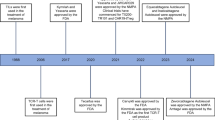Abstract
Numerous animal and clinical studies have shown that injection of T lymphocytes from a major histocompatibility complex matched donor can cure subjects with chemotherapy-resistant hematological malignancies. This graft-versus-tumor effect, which represents the most conclusive evidence that the immune system can cure cancer in humans, is mediated primarily if not exclusively by T cells specific for host minor histocompatibility antigens. Since minor histocompatibility antigens are present on all tissues and organs, injection of unselected donor T cells also causes graft vs. host disease, which drastically limits the use and benefits of this treatment. Recent studies in mice have shown that adoptive transfer of primed T cells targeted to a single major histocompatibility complex class I restricted immunodominant minor histocompatibility antigen can eradicate leukemia cells without causing any toxicity to the host. We present the promises and caveats of this and other new approaches for adoptive T cell immunotherapy of cancer.
Similar content being viewed by others
Author information
Authors and Affiliations
Additional information
Electronic Publication
Rights and permissions
About this article
Cite this article
Perreault, C., Brochu, S. Adoptive cancer immunotherapy: discovering the best targets.. J Mol Med 80, 212–218 (2002). https://doi.org/10.1007/s00109-001-0315-1
Received:
Accepted:
Published:
Issue Date:
DOI: https://doi.org/10.1007/s00109-001-0315-1




